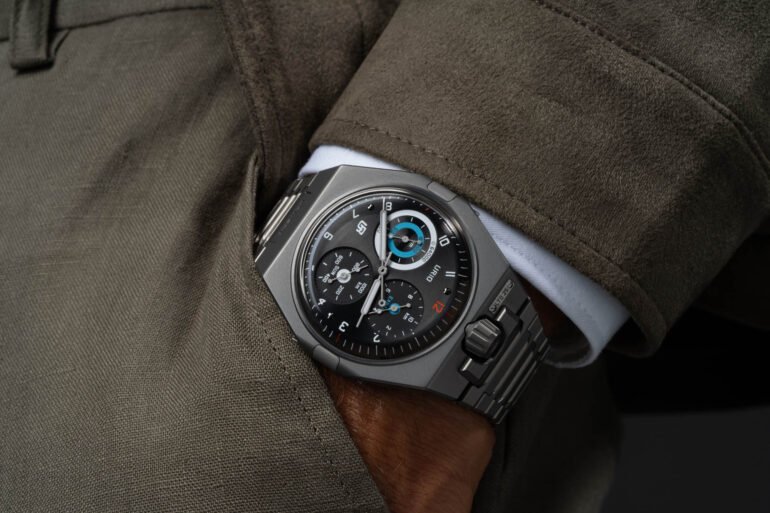Just when you think you know an indie brand, they go ahead and make a watch that looks kind of normal. That was one of the initial thoughts running through my head when the Urwerk team showed us the new UR-10 SpaceMeter during our Geneva Watch Days meeting last month. It is, without question, one of the most confounding releases in the brand’s history. This is a brand that has singlehandedly carved out a niche for themselves with highly technical, futuristic timepieces that employ wandering and satellite hours complications in innovative and unique ways. Their watches are usually not circular, they do not have traditional hands, and they don’t even really have what we’d think of as complications in a traditional sense. But the UR-10 proves that even when a brand has defined a category, there’s still plenty of opportunity to surprise with something new.
The concept of the SpaceMeter is to, unsurprisingly, measure space. That’s a pretty heady concept, but it’s rooted in classical watchmaking that has always been an influence on brand founders Felix Baumgartner and Martin Frei. In the case of the UR-10, the inspiration comes directly from an important clock in Baumgartner’s life, a 19th century pendulum clock signed by Gustave Sandoz. The unusual clock belonged to Baumgartner’s father, and upon taking ownership apparently had little idea of exactly what the subdials were meant to track. After a lot of research, Baumgartner determined that the clock was designed to measure the rotation of the earth, specifically showing the distance the planet is traveling across three separate timescales.
The UR-10 operates with a similar principle. Running on a movement developed in partnership with Vaucher Manufacture, the SpaceMeter displays information on speed at which the planet is traveling through space across three separate subdials. At 2:00, the “Earth” counter is timed to clock every ten kilometers the earth travels during the course of a single day. At 4:00, the “Sun” counter is fixed at 20 kilometer steps, representing every 1,000 kilometers the earth travels in its solar orbit in a single rotation. And at 9:00 the “Orbit” counter combines the two trajectories.
I’ll be honest, when I saw this watch, I stared at it for several minutes and had a difficult time grasping exactly what I was looking at. It’s not really a practical complication like a chronograph or GMT, but instead should be seen as a visual representation of a scientific principle. The planet is constantly in motion, and its speed as it travels through space is something that can be represented by the constant movement of a hand on a watch dial, and that’s what we’re looking at. Of course, the watch also tells the current time in a way that’s so normal it was at first hard to believe I was looking at an Urwerk at all. But considering what else they’re trying to capture here, I’d say the watch is very much in the brand’s tradition of challenging our own assumptions about time telling and what a watch can be.
In addition to being a singular conversation piece, it’s also just a great watch to wear. The 45.5mm case is crafted from sandblasted titanium and mounted to an integrated bracelet that hides a lot of that diameter measurement. The UR-10 is very thin, measuring just a little over 7mm tall, excluding the crystal. The watch is available in two dial options, brushed titanium and black, both limited to 25 pieces. The retail price is set at $94,000.
In addition to going over what the UR-10 actually is in our meeting with the brand, we spent a lot of time discussing how the watch might be received. Urwerk is well aware of how different this watch is from anything they’ve made before, but I think, at least in our meeting, they were able to successfully communicate why this fits in with Urwerk’s larger mission, which is all about challenging and breaking watchmaking conventions, while paying tribute to watchmaking history along the way. The UR-10, in my view, does exactly that, and while it might not please every Urwerk fan, it has a romanticism about it that I think will win many over. Urwerk
Zach Kazan
2025-10-15 14:00:00






